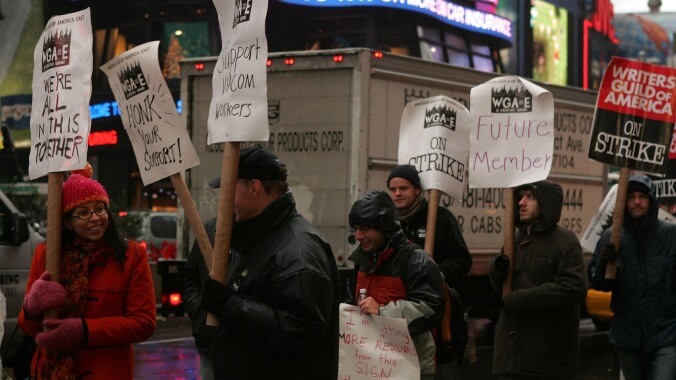Here's what happened last time there was a writers' strike in Hollywood
The 100-day long writers' strike in 2007-08 offers a glimpse at the industry's possible future

As the Writers Guild Of America prepares to reenter negotiations with the Alliance of Motion Picture and Television Producers, many across the industry are preparing for the worst but hoping for the best.
Per the Los Angeles Times, studios, networks, and television producers are preparing for a possible walkout by speeding up production schedules, stockpiling scripts, and leaning on international productions. Shooting schedules for shows have been bumped up and writers’ rooms opened early in order to secure scripts for upcoming seasons. Some networks renewed series earlier than usual to get the ball rolling on production, such as NBC’s Quantum Leap.
In anticipation of the worst, it’s been a bit of a mad dash to procure content ahead of the negotiations, which start on March 20 before the contract expires on May 1. Writers are not the only ones working in Hollywood with a contract running out this year; the unions overseeing actors and directors will also enter new negotiations ahead of the June 1 deadline, in what’s anticipated to be a “difficult” and “complicated” process.
If the 10,000 unionized writers do stage a walkout as part of the negotiation process, scripted television production would effectively halt across the board, from sitcoms to late-night shows. On the film side of things, features already have longer production timelines, giving them a little more wiggle room than scripted television.
In many ways, previous strikes, as well as the shutdown that happened as a result of COVID-19 have given studios a roadmap to deal with a work stoppage. Nonetheless, a lengthy strike would eventually delay premiere schedules, and depending on director and actor schedules, cause production to fall apart completely. As an alternative, reality TV projects offer one way for studios to fill in any gaps from paused production.
As always, a strike is not an inevitable part of labor contract negotiations, and usually depends on a company’s reluctance to guarantee its employees a living wage, reasonable benefits, and see them as human beings with needs and rights. The streaming age has drastically changed the industry over the last decade, and writers are looking to reevaluate how they are compensated as residuals continue to deplete. In preparation for our potential future, let’s look back 15 years, to the last time the writers walked out of their rooms.
The last writers’ strike occurred over 100 days in 2007-08, running from November 5 to February 12. The strike saw the complete shutdown of shows such as Saturday Night Live, which went without a new episode for the duration of the strike, laying off many employees in the process. Late-night television hosts were placed at the frontlines of the strike and pushed to make hard decisions regarding the well-being of their non-unionized staff, with most returning to their shows without writers after an extended hiatus. As the strike went on, Jay Leno, Conan O’Brien, and David Letterman all paid their non-striking staff out of their own pockets in the face of layoffs.
Several scripted shows, such as Bryan Fuller’s Pushing Daisies, were taken out at the knees by the strike. Fuller’s whimsical procedural show starring Lee Pace was given a full-season order just days before the strike. With only nine of the 22 allotted episodes written by the time Nov. 5 rolled around, Fuller had to cut the season short and edit the ninth episode into a much-too-soon finale. When the spring ushered an end to the strike, the show had not been able to return with the same momentum and was subsequently canceled by ABC. We of course understand and support the writers’ strike, but knowing that we missed out on (at least) 13 episodes of Pushing Daisies still hurts.
Pushing Daisies was far from alone in airing a truncated season, with popular shows such as Lost, Friday Night Lights, Gossip Girl, Heroes, Breaking Bad, and 30 Rock also trudging on with shortened seasons, resulting in several incoherent storylines and rushed endings. However, some shows ended up being saved from themselves, with Breaking Bad averting the death of Jesse Pinkman (Aaron Paul) due to its shortened first season.
While a late-March shutdown would leave many award ceremonies in the clear this year, the 2007 walkout disrupted the entire awards cycle, with many organizations pushed to cancel events. Ceremonies such as the SAG Awards and the Film Independent Spirit Awards were given waivers by the WGA to hire writers due to their previous solidarity with the union’s efforts. However, the Golden Globes ceremony was canceled and pared down to a press conference after its waiver fell through. The Academy Awards lucked out, as the strike ended just 12 days before its airtime.
As aforementioned, reality TV offers a crutch to studios still looking to produce series, and 2008 saw the rise in viewership of many reality programs, including Donald Trump’s The Celebrity Apprentice. Other shows such as The Amazing Race, American Idol, and the first season of Keeping Up With The Kardashians greatly benefitted from the lack of competition from scripted programs.
Finally, with several months of downtime, some writers took to creating other forms of content outside of the studio. 30 Rock cast members performed live shows on the picket lines, and Joss Whedon self-funded the internet production, Dr. Horrible’s Sing-Along Blog, starring Neil Patrick Harris, Nathan Fillion, Felicia Day, and Simon Helberg. Concerning the possibility of a writers’ strike in 2023, there are a few things we know to be true: Writers are insanely creative and scrappy, hard bargainers, and essential to the programming we know and love.